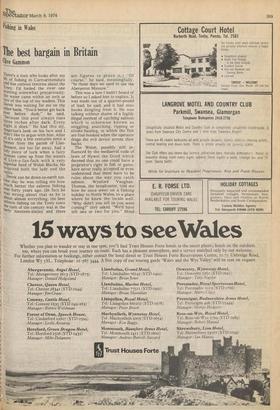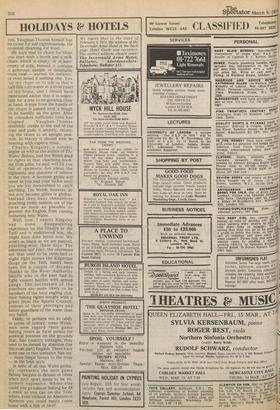The best bargain in Britain Clive Gammon There's a man
who looks after my bit of fishing in Carmarthenshire and has curious theories about the T°wY. I'd forded the river one evening somewhat precariously: the water came within an inch or two of the top of my waders. This Derek was waiting for me on the Other bank. "You'd better get back °„ver before dusk," he said, because this pool always rises three inches after dark. Every night it does." He had this sly, Magician's look on his face and I didn't like to argue with him. After all it's only a few centuries since a farmer from the parish of Llandeusant, not too far away, had a tidy piece of luck when a fairy Woman came up from the waters of Llyn-y-fan-fach with a very superior herd of Welsh Blacks. He acquired both the lady and the Cattle. Derek can be down-to-earth too. Cine day he was telling me how Illuch better the salmon fishing Was forty years ago. (In fact he was wrong about that as he is about almost everything: the best salmon fishing on the Towy since the turn of the century was in the early nineteen-sixties and there
are figures to prove it.) "Of course," he Said, meaningfully, "In those days we used to use the Aberaeron Minnow."
This was a lure I hadn't heard of before so I asked him to explain. It was made out of a quarter-pound of lead, he said, and it had nine hooks dangling from it. He was talking without shame of a highly illegal method of catching salmon which is otherwise known as sniggling, snatching, ripping or stroke-hauling, in which the fish are foul-hooked when the operator drags the evil device across their backs.
The Welsh, possibly still influenced by the mediaeval code of laws of Hywel the Good which decreed that no one could have a proprietor's right in fish or game, have never really accepted or even understood that there have to be rules about the way you catch salmon. Wynford VaughanThomas, the broadcaster, told me how he once went on a fishing holiday to North Wales, to a place where he knew the locals well. "Why didn't you tell us you were coming?" they asked. "We'd have left one or two for you." Mind you, Vaughan-Thomas himself has no cause for self-righteousness. He invented churning for trout.
He says that to churn for trout you start with a brook and a milk churn which is empty, or at least empty of milk. Instead, it contains a generous sample of delectable trout food — worms, tor Instance, or even bread if nothing else. You lay the churn on its side so that it half-fills with water in a trouty part of the brooK, and I should have mentioned earlier that it is important for a tree to be growing close at hand. A rope from the handle of the churn is passed over a bough to lie handily on the grass. After he considers sufficient time has
elapsed Vaughan-Thomas stealthily creeps to the end of the rope and pulls it smartly, returning the churn to an upright position. In theory it should now be heaving with captive trout.
Charles Kingsley, a notable angler as well as the author of The Water Babies, had the Welsh dead to rights in that charming book. An Irish gillie, he said, will fill you full of optimistic lies about the regiments and platoons of salmon in the river. A Scottish ghillie will sneer at you and your tackle until you are too demoralised to catch anything. The Welsh, however, do not ever become gillies or ghillies. Instead they busy themselves poaching every salmon out of the river as soon as possible to prevent the English from coming bothering into Wales.
Well, now, I expect Kingsley had some disappointing experience on the Glaslyn or the Teifi and it embittered him. He might have done better now. We aren't as black as we are painted, poaching-wise, these days. The notorious siot facer, the enormous net that used to be stretched at night right across the Kilgerran Gorge on the Teifi, hasn't been seen for a couple of decades thanks to the River Authority bailiffs who in the past had to fight violent battles with armed gangs. The successors of the poachers are more likely to be members of the local angling club, their fishing rights bought with a grant from the Sports Council, jealous of their privileges and better guardians of the water than any bailiff.
Oddly, or perhaps not so oddly in terms of history, some Welshmen now regard their game fishing rivers as focal points for political protests on the grounds that, like country cottages, they tend to be owned by absentee (for the most part) English. There have been one or two tentative 'fish-ins' — mass illegal forays to the river — in the Irish style.
In spite of all this Wales probably represents the best game fishing bargain in Britain in times when such sport tends to be extremely expensive. Where else could you go salmon fishing for £8 a week as you can on the Teifi, where, even without an Aberaeron Minnow you could easily come home with a fish or two?



































 Previous page
Previous page